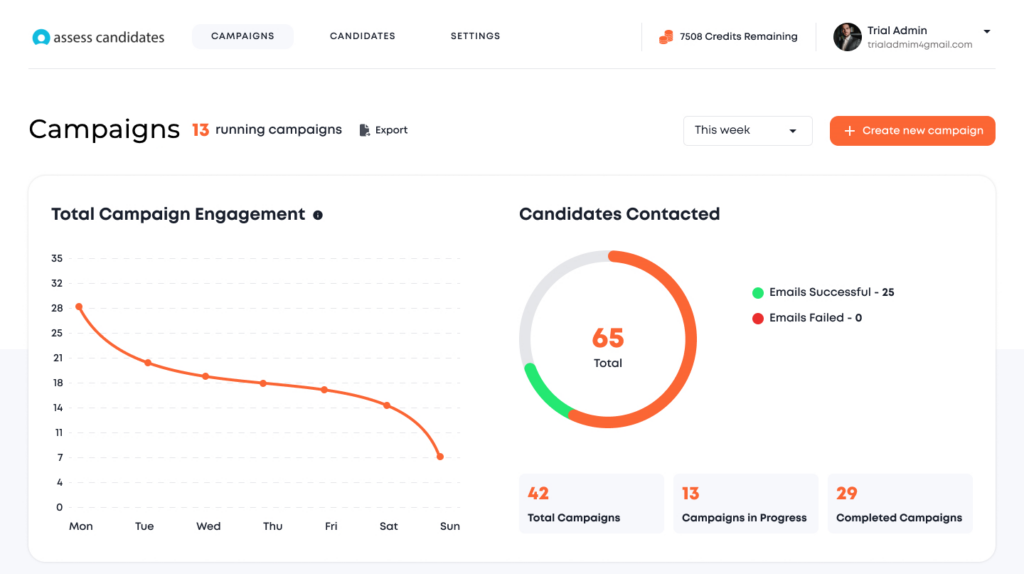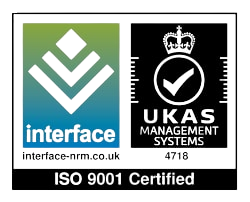How to select pre-employment assessment tests for roles that require hybrid work?
The remote and hybrid work did not go away with the end of the COVID-19 pandemic – and all the evidence points to it is here to stay. A few questions remain for the business leaders. How should companies adapt their recruitment strategies to reflect this trend? How can recruiters identify individuals adept at navigating the challenges of hybrid work and remote collaboration? What’s the key to hybrid work success?
In today’s digital age, pre-employment assessments emerge as key tools, offering insights into a candidate’s suitability for hybrid work; from evaluating virtual communication skills to assessing adaptability and tech-savviness. Join us as we look deeper into the connection between candidate assessment and hybrid work.
Read more to explore the best practice strategies to redefine your recruitment processes for the future of hybrid work.
Contents
- What is the impact of the hybrid work model on businesses and employees?
- What can pre-employment assessment tests tell recruiters about a candidate’s suitability for hybrid work?
- What are the best pre-employment assessment tools for hybrid work hiring?
- Three reasons why Assess Candidates is your best ally for pre-employment assessment tests
- FAQs and Glossary of Terms
1. What is the impact of the hybrid work model on businesses and employees?
As organizations continue to adapt to a post-pandemic world, the hybrid work model – which combines remote work with in-office collaboration – has emerged as a common business approach to balance flexibility and collaboration. Several key factors are influencing these choices.
Below, we delve into the key impacts of the hybrid work model on businesses and employees.
10 ways in which hybrid work model influences businesses:
- Technology Integration: The integration of advanced technologies has been a cornerstone of the hybrid work model. Cloud-based collaboration tools, video conferencing platforms, project management software, and virtual communication channels are now integral to daily operations. As businesses invest in these technologies, they pave the way for seamless collaboration among remote and in-office teams.
- Workforce Flexibility: A fundamental shift in employee expectations towards greater flexibility has been a driving force for the adoption of hybrid work. The future workforce values the option to choose where and when they work, promoting a healthier work-life balance. Companies that prioritize flexibility are likely to attract and retain top talent in this competitive landscape.
83% of the employees intend to leave the job if paid less for working from home.
Quixy
- Employee Well-being: Hybrid work, when implemented effectively, has the potential to enhance employee well-being. Reduced commuting time, increased autonomy over work schedules, and the ability to create personalized work environments contribute to a positive impact on mental health and job satisfaction. Business leaders are recognizing the correlation between employee well-being and overall productivity.
Eighty-one percent of workers report being less stressed when they work remotely, and 79% report experiencing improved mental health.
Owl Labs
- Organizational Culture: Maintaining a strong organizational culture becomes a challenge in a hybrid environment. Business leaders must actively foster a sense of belonging and connectivity among team members, irrespective of their physical location. This requires intentional efforts such as virtual team-building activities, regular communication, and the use of collaborative platforms to recreate the social dynamics of an office setting.
- Performance Metrics and Evaluation: Hybrid work necessitates a reevaluation of traditional performance metrics. Leaders are exploring new ways to measure productivity, focusing on outcomes rather than hours worked. Key performance indicators (KPIs) may shift to emphasize project completion, collaboration effectiveness, and individual contributions. Adaptive performance evaluation strategies are crucial for aligning employee goals with organizational objectives.
58% of the employees said that their productivity increased by hybrid work.
McKinsey
- Diversity and Inclusion: The hybrid work model has the potential to enhance diversity and inclusion efforts. By removing geographical constraints, companies can tap into a more diverse talent pool. However, leaders must be intentional about creating inclusive virtual spaces and ensuring that remote employees have equal opportunities for career growth and development.
54% of the employees claimed that inclusion and diversity in the workplace improved with hybrid work.
McKinsey
- Cybersecurity Challenges: As the hybrid work model relies heavily on digital infrastructure, organizations face heightened cybersecurity challenges. Protecting sensitive data and ensuring the secure use of remote access tools become paramount. Investments in robust cybersecurity measures and employee training on cyber hygiene are crucial to mitigate risks.
- Real Estate and Cost Savings: Embracing hybrid work often translates to reduced reliance on physical office spaces. Organizations can leverage this shift to achieve significant cost savings related to real estate, utilities, and other overhead expenses. Strategic financial planning becomes essential as companies navigate a hybrid work model while optimizing their physical footprint.
Hybrid work helps reduce real estate and operating costs by up to 50%.
Fortune
- Operational Flexibility: The hybrid work model grants businesses increased operational flexibility. It allows for the optimization of resources, enabling a more adaptable response to changing market conditions. Organizations can scale their workforce up or down without being constrained by physical office limitations.
- Adaptation to Virtual Collaboration: Employees are adapting to virtual collaboration tools and modes of communication. Skills related to effective virtual collaboration, digital communication, and time management become increasingly crucial for success in the hybrid work environment.
Identify candidates suitable for hybrid work with industry-leading pre-employment assessments. Hire For Free
2. What can pre-employment assessment tests tell recruiters about a candidate’s suitability for hybrid work?
Pre-employment assessment tests offer a comprehensive view of a candidate’s suitability for a hybrid work model by evaluating a diverse range of skills, competencies, and personal attributes. These pre-employment assessments enable recruiters to make informed decisions, ensuring that candidates not only possess the necessary technical skills but also exhibit the qualities essential for success in the evolving landscape of hybrid work.

Below is a comprehensive list of what pre-employment assessment tests tell recruiters about candidate’s suitability for hybrid work.
How do assessments for hiring evaluate a candidate’s suitability for hybrid work?
- Communication Skills: Pre-employment assessments can gauge a candidate’s written and verbal communication skills, crucial for effective virtual collaboration and clear remote communication.
- Digital Literacy: Assessment tests can evaluate a candidate’s proficiency with digital tools, platforms, and remote collaboration technologies, ensuring they can navigate the digital landscape of hybrid work seamlessly.
- Time Management: Pre-employment assessments provide insights into a candidate’s ability to manage time effectively, demonstrating their capacity to prioritize tasks and meet deadlines in a remote or flexible work setting.
- Self-Motivation: Pre-employment tests can reveal a candidate’s level of self-motivation and discipline, essential qualities for staying focused and productive while working independently.
- Adaptability: Assessment tests evaluate how well a candidate adapts to new situations and environments, reflecting their capacity to navigate the changing dynamics of hybrid work.
- Collaboration and Teamwork: Pre-employment tests measure a candidate’s ability to collaborate virtually, highlighting their aptitude for contributing to a team even when physically distant.
Hybrid companies see 25-30% higher revenue per employee than fully remote or in-person.
Deel
- Problem-Solving Skills: Assessments can provide insights into a candidate’s problem-solving abilities, crucial for resolving issues independently in a remote work setting.
- Initiative and Autonomy: Tests gauge a candidate’s willingness to take initiative and work autonomously, showcasing their ability to drive results without constant supervision.
- Tech-Savviness: Pre-employment tests evaluate a candidate’s comfort and proficiency with technology, ensuring they can leverage digital tools effectively for remote collaboration.
- Results-Oriented Focus: Assessment tests can reveal a candidate’s focus on results, indicating their commitment to achieving goals and delivering outcomes regardless of their physical work location.
- Flexibility and Adaptability: Pre-employment tests assess a candidate’s flexibility in adapting to changes, reflecting their ability to navigate the evolving nature of hybrid work structures.
Companies save $11,000 per year per employee in a hybrid environment.
Officend.com
- Cultural Fit in a Remote Environment: Assessment tests can provide insights into how well a candidate aligns with the company culture, even when working remotely, ensuring a cohesive and collaborative virtual work environment.
- Work Ethic: Pre-employment tests can reveal a candidate’s work ethic, demonstrating their commitment to maintaining productivity and quality of work in a hybrid work setting.
- Conflict Management: Assessments may include scenarios that assess a candidate’s approach to managing conflicts in a virtual setting, ensuring they can maintain positive team dynamics.
- Cross-Cultural Competence: For global or diverse teams, assessment tests can evaluate a candidate’s cross-cultural competence, ensuring they can collaborate effectively with team members from different backgrounds.
- Critical Thinking in Remote Scenarios: Assessments may include scenarios that require critical thinking skills in a remote context, evaluating a candidate’s problem-solving abilities in virtual scenarios.
Future-proof your organization by selecting candidates who thrive in hybrid work scenarios. View Plans
3. What are the best pre-employment assessment tools for hybrid work hiring?
We have seen what skills and competencies pre-employment assessment tests can evaluate for a candidate’s hybrid work suitability. Let us now look at the different types of pre-employment assessment tests that can be used by your company for a comprehensive approach to evaluating your potential candidates for hybrid work roles.

By leveraging a diverse set of assessment tools, you can make informed decisions, ensuring that candidates not only possess the necessary skills but also align with the cultural and behavioral requirements of a hybrid work environment.
Which pre-employment assessment tools should be used for hybrid work hiring?
- Ability Tests:
- Ability tests, such as numerical reasoning or logical reasoning assessments, are instrumental in evaluating a candidate’s cognitive capabilities. These tests can ensure that candidates possess the technical skills necessary for their roles in a hybrid work setting. Additionally, they provide valuable insights into a candidate’s problem-solving and critical thinking skills, which are essential for navigating challenges independently in a remote or flexible work environment.
Relevant skills assessed: Technical proficiency, problem-solving, critical thinking, and cognitive abilities.
- Situational Judgment Tests:
- Situational judgment tests present candidates with real-world scenarios they might encounter in a hybrid work setting. By assessing how candidates respond to these situations, recruiters can gain insights into their decision-making abilities, adaptability to changing circumstances, and interpersonal skills. These tests are particularly effective in evaluating a candidate’s approach to conflict resolution, a skill crucial for maintaining positive team dynamics in virtual or hybrid team environments.
Relevant skills assessed: Decision-making, adaptability, interpersonal skills, and conflict resolution.
- Work Personality Tests:
- Work personality tests delve into a candidate’s personality, providing insights into their work style, interpersonal preferences, and emotional intelligence. These assessments are valuable for evaluating a candidate’s suitability for collaborative virtual work environments, as they shed light on communication preferences, teamwork tendencies, and the ability to adapt to different working styles. Candidates with strong interpersonal skills and adaptability are better positioned for success in a hybrid work model.
Relevant skills assessed: Collaboration, communication, adaptability, and emotional intelligence.
- Game-Based Assessments:
- Game-based assessments offer a dynamic and engaging way to evaluate a candidate’s cognitive abilities and problem-solving skills. These assessments simulate real-world challenges and scenarios, allowing recruiters to observe a candidate’s creativity, adaptability, and ability to navigate digital environments. Given the reliance on technology in hybrid work settings, game-based assessments provide a unique perspective on a candidate’s digital literacy and capacity for innovation.
Relevant skills assessed: Problem-solving, creativity, adaptability, and digital literacy.
- Video Interviews:
- Video interviews, especially those incorporating scenario-based questions, assess a candidate’s communication skills and their ability to articulate ideas effectively in a virtual setting. These interviews provide a glimpse into a candidate’s virtual collaboration abilities, as recruiters can observe their engagement, active listening, and responsiveness. Furthermore, video interviews allow for the assessment of emotional intelligence through non-verbal cues, contributing to a more holistic evaluation of a candidate’s suitability for remote or hybrid work.
Relevant skills assessed: Communication, virtual collaboration, emotional intelligence, and cultural fit.
Select candidates who align perfectly with your hybrid work goals. View Plans
4. Three reasons why Assess Candidates are your best ally for pre-employment assessment tests
Make Assess Candidates your strategic partner in shaping the workforce of tomorrow. As the business landscape continues to evolve, our tailored assessments, comprehensive evaluation approach, and commitment to technological excellence position us as your best ally for pre-employment assessment tests in the era of hybrid work.
Choose Assess Candidates and unlock the potential of a workforce that excels in flexibility, collaboration, and success in the dynamic world of hybrid work.
Here are three compelling reasons why Assess Candidates stands out as your best partner for pre-employment assessment tests in the hybrid work arena.
3 reasons to partner with Assess Candidates for hybrid work hiring:
- Tailored Assessments for Hybrid Success: Assess Candidates understands the unique demands of hybrid work and tailors its assessments to evaluate the specific skills and competencies crucial for success in flexible and remote environments. Whether you’re seeking candidates with exceptional virtual collaboration skills, adaptability to changing work structures, or strong communication in a digital context, our assessments are designed to pinpoint the qualities that matter most in the hybrid landscape.
- Comprehensive Evaluation of Hybrid Competencies: Success in hybrid work goes beyond technical proficiency. Assess Candidates goes the extra mile by providing a holistic evaluation of candidates, encompassing not just their skills but also their adaptability, emotional intelligence, and virtual collaboration capabilities. Our suite of assessments includes a diverse range of tools enabling you to gain a nuanced understanding of candidates’ suitability for hybrid roles.
- Seamless Integration of Technology and Innovation: Embracing the future of work requires cutting-edge solutions, and Assess Candidates delivers. Our platform seamlessly integrates advanced technologies and innovative assessment methods to provide a user-friendly and insightful experience. Stay ahead in the competitive talent landscape with assessments that not only meet the demands of the present but also anticipate the needs of the future.

Example of client problem and Assess Candidates solution.
Client Problem:
A client who has previously used our platform to run recruitment campaigns has approached us for a new project. Business leaders at the client firm decided to permanently switch to a hybrid work model, leaving employees all autonomy over decisions of when and how they work. Firm management anticipated this could affect the firm’s productivity and team culture.
Assess Candidates Solution:
Using work personality questionnaires and pre-recorded video interview assessments to select those with the right fit and understanding of what it takes to excel in a hybrid work environment. Feedback from hiring managers was that new recruits quickly adapted to hybrid work arrangements, proving to be autonomous and motivated.
5. FAQs and Glossary of Terms
FAQs
- What are the key impacts of the hybrid work model on businesses and employees?
- The hybrid work model significantly influences technology integration, workforce flexibility, employee well-being, organizational culture, performance metrics, diversity and inclusion, cybersecurity challenges, real estate and cost savings, operational flexibility, and adaptation to virtual collaboration.
- How does technology play a pivotal role in the hybrid work model?
- Technology is integral to the hybrid work model, with cloud-based collaboration tools, video conferencing platforms, project management software, and virtual communication channels becoming essential for seamless collaboration among remote and in-office teams.
- What is the fundamental shift in employee expectations driving the adoption of hybrid work?
- Employees now seek greater flexibility in where and when they work, promoting a healthier work-life balance. The future workforce values the option to choose, and companies prioritizing flexibility are more likely to attract and retain top talent.
- How does the hybrid work model impact employee well-being?
- When implemented effectively, hybrid work has the potential to enhance employee well-being by reducing commuting time, providing autonomy over work schedules, and allowing the creation of personalized work environments, contributing to positive impacts on mental health and job satisfaction.
- What challenges does the hybrid work model pose to organizational culture?
- Maintaining a strong organizational culture becomes challenging in a hybrid environment. Business leaders must actively foster a sense of belonging and connectivity among team members, requiring intentional efforts such as virtual team-building activities, regular communication, and the use of collaborative platforms.
- How does the hybrid work model impact performance metrics and evaluation strategies?
- Hybrid work necessitates a reevaluation of traditional performance metrics, with a focus on outcomes rather than hours worked. Key performance indicators (KPIs) may shift to emphasize project completion, collaboration effectiveness, and individual contributions. Adaptive performance evaluation strategies are crucial for aligning employee goals with organizational objectives.
Glossary of Terms
- Hybrid Work Model: A work arrangement that combines remote work with in-office collaboration, offering employees flexibility in choosing where and when they work.
- Cloud-Based Collaboration Tools: Software and platforms hosted on the cloud that facilitate virtual collaboration, file sharing, and communication among remote teams.
- Workforce Flexibility: The ability for employees to choose their work location and schedule, promoting a balance between professional and personal life.
- Organizational Culture: The shared values, beliefs, and practices that shape the identity and behavior of individuals within an organization.
- Key Performance Indicators (KPIs): Quantifiable metrics used to evaluate the success of an organization, team, or individual in achieving specific objectives.
- Cybersecurity Challenges: Risks and threats related to the security of digital information and technology infrastructure in the context of remote and hybrid work.
